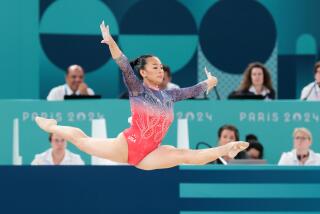Bubka Wins Title, but It’s Not Enough
- Share via
ATHENS — The sun had long since vaulted over the horizon Sunday, darkness falling on the last day of the first IAAF World Championships not to have produced a world record.
There have been six of these meets--the first in 1983--and Sergei Bubka of the Ukraine had just clinched his sixth gold medal in the pole vault, running his unprecedented dominance of the event to 14 years.
Beyond that, Bubka had just vaulted a World Championship meet record 6.01 meters (19 feet 8 3/4 inches) a mere 10 weeks after resuming workouts following surgery on a partially torn right Achilles’ tendon he first hurt before the 1996 Olympics.
But the capacity crowd at Olympic Stadium wanted more.
They saw the bar ascend again and the scoreboard flash the height that next awaited Bubka:
6.15
A world record attempt of 20 feet 2 1/4 inches--a half-inch more than the existing mark, set by Bubka at Sestriere, Italy, in 1994.
Bubka made one half-hearted approach down the runway but pulled up well before the box, never launching the attempt.
With that, Bubka put down his pole. His meet was over, his night was done, these championships would end without a world record.
As Bubka sat and posed for photographers, grinning and holding up six triumphant fingers in front of the arsenal of zoom lenses, the disappointed crowd began to whistle, the European equivalent of the Bronx cheer.
Bubka was passing on history, not to mention the $100,000 the IAAF was offering anyone who set a world record at this competition.
But jeers for the greatest pole vaulter since someone decided that furniture was too boring a use for bamboo?
Boos for the man who won five world championships before undergoing career-threatening ankle surgery last December and now had won his first post-op?
“They were right,” Bubka said.
“Six-oh-one was good, but they want to see the world record. To the public, I want to say, my Achilles’ was sore. I take anti-inflammatories every day. It is the finals and I am really lucky I am winning.
“The public must understand. This is my first [major] meet since coming back. I am really happy just to be the winner.”
Bubka out-vaulted the 1997 world leader, Maksim Tarasov of Russia, who went out at 5.96 meters (19-6 3/4), and held off the surprising challenge of little-known American Dean Starkey.
With a leap of 5.91 meters (19-4 3/4), Starkey finished third, winning the first U.S. pole vaulting medal at a non-boycotted major world competition since Dave Roberts took the bronze at the 1976 Olympics.
“I couldn’t be more pleased,” said Starkey, who qualified for this meet by virtue of his second-place showing at last month’s U.S. nationals, yet outlasted the likes of 1996 Olympic gold medalist Jean Galfione of France, two-time African champion Okkert Brits of South Africa and two-time American titlist Lawrence Johnson--the latter two eliminated during qualifying.
“There was lot of great jumping going on today, and I’m just happy to sneak into the medals. . . . Sergei is unbelievable. He never ceases to amaze me. No one will ever be able to do what he has done. It will never be done again.”
Even Bubka, 33, was uncertain about this championship, coming barely seven months after surgery to repair a partially torn Achilles’ tendon that prevented him from competing in the Atlanta Olympics.
Bubka said he didn’t resume serious training until May 31, only two months before the start of the World Championships.
But once in the final, Bubka was consumed by the quest for a sixth title. The tightly set jaw, the steely-eyed laser stare--so focused was Bubka on the task awaiting him that he refused to shake hands with Tarasov beforehand.
“Sergei, why didn’t you shake my hand before the competition?” Tarasov playfully asked Bubka during their interview session together.
Bubka barely cracked a smile.
“I think it is not necessary,” he said. “I told you I will shake hands after the meet.”
Bubka won this gold medal by attempting only five jumps and successfully completing three--at 5.7 meters, 5.91 and 6.01.
Not wanting to tax his still-tender Achilles, Bubka strategically passed attempts of 5.5, 5.8, 5.86 and 5.96 meters.
“I can say I only did one jump--6.01,” Bubka said, frowning and shrugging.
“Five-seven and 5.91 are not jumps, there are just . . . something.”
On his winning attempt, Bubka cleared the bar by a good six inches--a legitimate 20-foot vault that thrilled the crowd, but ultimately served only to tease them.
“For me, it was difficult to decide to continue for 6.15 or not because of my tendon,” Bubka said. “I was afraid. I am thinking, ‘Can I walk tomorrow? What will be the situation with my Achilles’?’
“And it was difficult to compete further after [clinching] the gold medal. It was hard to find motivation.”
Having contemplated retirement a year ago, Bubka claimed this championship has re-energized him. Sunday night, he was talking about making a run at a seventh world championship in 1999 and one more Olympic appearance in 2000.
“It is my dream to continue to Sydney,” Bubka told reporters before pausing and finally managing a grin.
“You saw the stories after Atlanta. I was in funeral stories of most journalists. ‘I am dead, I am finished.’
“I find motivation from that. I find motivation to come back and give you some work.”
More to Read
Go beyond the scoreboard
Get the latest on L.A.'s teams in the daily Sports Report newsletter.
You may occasionally receive promotional content from the Los Angeles Times.






